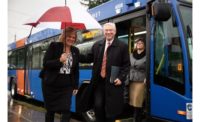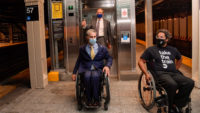The Regional Transit Commission of Southern Nevada is looking into ways to improve its infrastructure in a 31-sq-mile area that includes downtown Las Vegas and surrounding communities. Officials plan to study ways to boost the system’s sustainability and equitability.
A $630,000 grant from the Federal Transit Administration’s Areas of Persistent Poverty program will help fund the study, as well as design concepts. The grant is one of 47 FTA awarded July 20 to communities in U.S. Census-defined low-income areas to fund studies looking into ways to improve public transportation. Together, the grants amount to more than $20 million. While not funding construction directly, the various studies and planning initiatives being funded could lead to various projects in the future.
M.J. Maynard, CEO of RTC of Southern Nevada, said in a statement that the FTA funding “will help the RTC identify and prioritize mobility infrastructure improvements in a part of the valley that is traditionally underserved.”
RTS’s study will examine the potential for building neighborhood mobility hubs offering various options like buses, one-demand services, bike share and car share. It would also look at ways to improve existing transit stop design, such as with more seating, safety features and shade. It will also consider streetscape improvements like widening sidewalks, building dedicated bus and bike lanes and improving crosswalk safety. About 220,000 people live in the study area, according to RTC.
The competitive grant program is part of wider efforts by the Biden administration to modernize infrastructure across the company, according to FTA. The money is available for planning, engineering and development of projects to create new transit routes, build facilities or otherwise improve transit services in historically disadvantaged communities. U.S. Transportation Secretary Pete Buttigieg said in a statement that people living in low-income rural, urban and tribal communities are more likely to rely on public transit.
“Through this program, we are bringing affordable, accessible public transit to the very communities that need it most, making it possible for more people to access jobs, resources and opportunity,” Buttigieg said.
FTA said in its funding announcement that it had received applications seeking a total of nearly $36 million. The recipients are located in 33 states.
California has the most projects selected for the grant program and the most total funding, with five projects set to receive a total of $2.45 million.
Three projects were tied for the greatest funding amount. The Alaska Dept. of Transportation & Public Facilities plan to assess statewide transportation needs, the Fresno, Calif., plan to identify potential transit corridors for fixed-route service and mobility hubs and the San Diego Association of Governments in California work planning and engineering upgrades to the San Ysidro Transit Center will each receive $785,400.
Other recipients with grant amounts on the higher end include Chicago Transit Authority, which plans to assess whether it should reopen the Englewood (Green) Line Racine station with modern accessibility standards with a $778,500 grant. Volusia County, Fla., will use a $750,000 grant for planning and engineering of an intermodal transfer facility serving fixed-route and microtransit riders in low-income areas.
“Transit is the great equalizer, providing rides for those who do not have a car or cannot drive,” FTA Administrator Nuria Fernandez said in a statement. “And particularly in rural and tribal areas, having access to an affordable, reliable bus ride can mean the difference between isolation and opportunity.”






Post a comment to this article
Report Abusive Comment